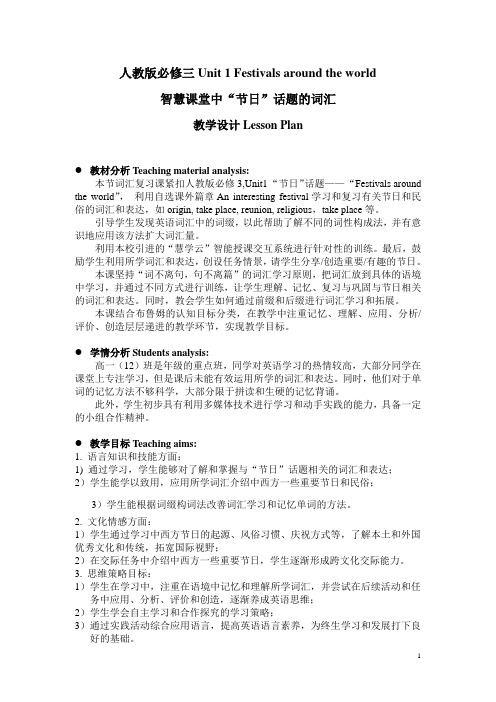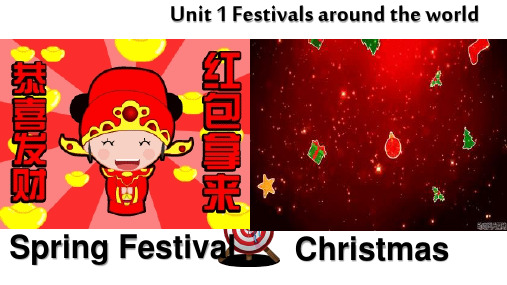人教版高中英语必修三Unit+1+Festivals+around+the+world-1+教案.doc
- 格式:doc
- 大小:45.00 KB
- 文档页数:10

Unit 1 Festivals around the world ——Reading ——节日和庆典自古以来,世界各地就有各种各样的节目和庆典。
大多数古老的节日总是庆祝严寒的结束,春季的种植和秋天的收割。
有时,在猎人捕获猎物后,也举行庆祝活动。
在那个时代,如果食物难以找到,特别是在寒冷的冬月,人们就会挨饿,现在的节日有很多由来,一些是宗教上的,一些是季节性的,一些是纪念特殊的人和事件的。
亡灵节些节目是为了纪念死者,或使祖先得到满足,因为祖先们有可能回到世上(给人们)提供帮助,也有可能带来危害。
在日本盂兰盆节,人们要扫墓、烧香,以缅怀祖先。
人们还点起灯笼,奏响乐曲,因为他们一位这样做可以把祖先引到世上。
在墨西哥,亡灵节是在月初。
在这个重要的节日里,人们会吃制成颅骨形状的食物,和装点有“骨头”的蛋糕。
他们向亡者祭献食物、鲜花和礼品。
西方的万圣节也源自人们古老的信念,以为亡者的灵魂会返回人间。
万圣节如今成了孩子们的节目,这天他们可以乔装打扮上邻居家要糖吃。
如果邻居什么糖也不给,那么孩子们就可以捉弄他们了。
纪念名人的节目也有纪念名人的节目。
中国的端午节(龙舟节),是纪念古代著名诗人屈原的。
美国的哥伦布日是纪念克里托斯.哥伦布发现“新大陆”的日子。
印度在10月2日有个全国性的节目,纪念莫汉达斯.甘地,他是帮助印度脱离英国而独立的领袖。
庆丰收的节日收获与感恩节是非常喜庆的节目。
越冬的粮食收集起来了,农活结束了,人们都心怀感激。
在欧洲国家,人们通常用花果来装饰教堂和市政厅,在一起聚餐。
有些人还可能因为他们的农产品(参加各种评选)而获奖,比如最大的西瓜或最帅的公鸡。
中国和日本都有中秋节,这时,人们会赏月。
在中国,人们还品尝月饼。
春天的节日最富生气的而又最重要的节日,就是告别冬天,迎来春天的日子。
中国人过春节要吃饺子、鱼和肉,还要给孩子们送红纸包着的压岁钱。
(他们)舞龙灯、狂欢,全家人聚在一起欢庆阴历年。
在一些西方国家有激动人心的狂欢节,通常在二月,复活节前的四十天。


人教版必修三Unit 1 Festivals around the world智慧课堂中“节日”话题的词汇教学设计Lesson Plan●教材分析Teaching material analysis:本节词汇复习课紧扣人教版必修3,Unit1 “节日”话题——“Festivals around the world”,利用自选课外篇章An interesting festival学习和复习有关节日和民俗的词汇和表达,如origin, take place, reunion, religious,take place等。
引导学生发现英语词汇中的词缀,以此帮助了解不同的词性构成法,并有意识地应用该方法扩大词汇量。
利用本校引进的“慧学云”智能授课交互系统进行针对性的训练。
最后,鼓励学生利用所学词汇和表达,创设任务情景,请学生分享/创造重要/有趣的节日。
本课坚持“词不离句,句不离篇”的词汇学习原则,把词汇放到具体的语境中学习,并通过不同方式进行训练,让学生理解、记忆、复习与巩固与节日相关的词汇和表达。
同时,教会学生如何通过前缀和后缀进行词汇学习和拓展。
本课结合布鲁姆的认知目标分类,在教学中注重记忆、理解、应用、分析/评价、创造层层递进的教学环节,实现教学目标。
●学情分析Students analysis:高一(12)班是年级的重点班,同学对英语学习的热情较高,大部分同学在课堂上专注学习,但是课后未能有效运用所学的词汇和表达。
同时,他们对于单词的记忆方法不够科学,大部分限于拼读和生硬的记忆背诵。
此外,学生初步具有利用多媒体技术进行学习和动手实践的能力,具备一定的小组合作精神。
●教学目标Teaching aims:1. 语言知识和技能方面:1) 通过学习,学生能够对了解和掌握与“节日”话题相关的词汇和表达;2)学生能学以致用,应用所学词汇介绍中西方一些重要节日和民俗;3)学生能根据词缀构词法改善词汇学习和记忆单词的方法。



人教新课标高中英语必修三Unit 1 Festivals around the world全章教案I.教学内容分析本单元的中心话题是“节日”,主要讲述了不同地区不同种类的节日。
Warming Up部分设计了小组活动,通过图表填写让学生区分中国的传统节日与别国节日的异同,目的在于激活学生已有的节日背景知识,引出主题,为以后几堂课学习热身。
Pre-reading 通过几个问题,调动学生已有的知识和经验,激发学生想了解更多节日的好奇心,让他们主动参与到主题教学活动中,为下面学习阅读文章作铺垫。
Reading 部分先简要介绍了一下早期各种节日的起源以及存在的原因,然后又分别介绍了几种世界各地的节日,依次的顺序是亡灵节、纪念名人的节日、丰收节、春天的节日等。
Comprehending由四个部分组成。
第一、三、四部分通过表格形式,第二部分通过让学生回答问题的方式,鼓励学生积极思考,加深对课文的理解。
Learning about Language 部分主要突出了本单元的语法项目——情态动词的用法。
这些情态动词主要有:can,could,may,might,will,would,shall,should,must,can’t 等的用法。
Using Language 部分中包括了听、说、读、写几个部分的内容。
学生可通过对Trinidad Carnival、情人节等一些节日的学习,分析问题,锻炼自己的思维能力。
阅读后的习题及讨论不仅帮助学生理解文章的主旨大意,更重要的是让学生寻找解决问题的方法。
Learning Tip部分主要建议学生搜集各种资料,查询与世界各地节日有关的信息,了解各种节日的来源与内涵。
II.教学重点和难点1. 教学重点(1) 本单元的生词和短语;(2) 掌握一些情态动词的基本用法;(3) 了解有关节日和民俗,掌握有关词汇,如custom,religious等。
2. 教学难点(1) 增进学生对中国节日的理解,了解和感悟外国的节日;(2) 提高学生的社会文化素质,加强跨国文化素质;(3) 培养学生运用资源策略。
人教版高中英语必修三Unit 1 Festivals around the worldI.核心单词1.starve 饿死2. obvious 明显的3. satisfy 满足;使满意4. lead 领导;引导5. origin 起源;源头6. trick 诡计,窍门;欺骗,诈骗7. arrival 到来,到达8. national 国家的9. gain 得到,获得10. independence 独立11. gather 集合12. European 欧洲的13. custom 习俗,风俗14. award 奖品; 授予II.重点短语1.take place 发生2. day and night 日夜3. in memory of 纪念;追念4. dress up 盛装;打扮5. play a trick on 诈骗;开玩笑6. look forward to 期盼;盼望7. as though 好像8. have fan with 玩得开心9. turn up 出现;到场10. keep one’s word 守信用11. h old one’s breath 12. Set off 出发13. r emind …of … 使……想起……III.课文内涵及外延短语及其用法1.Mean 意欲,打算,意味(1)sb./sth. be meant /intended to do 某人/某物专门被用来做……E.g. The students in that university are meant to be teachers.E.g.His father meant him to be a businessman.(2)sb./sth. be meant/intended for 打算使某人/某物为……所用/做……E.g.He was meant for teaching.(3)mean sb. for …打算让某人成为E.g.He didn’t mean for a translator.(4) mean to do sth. 打算做某事E.g.He meant to go to America.(5) mean doing sth.(6) mean something/nothing2.celebration 庆祝;庆典in celebration of 为了庆祝……E.g. They decided to hold a party in celebration of their father’s birthday.have/ hold a celebration 举行庆祝会/庆典celebrated adj. = famous adj. 著名的,驰名的3.take place 发生,举行,进行take the place of …代替……E.g. He will take the place of the manager when the manager go abroad.take one’s place 代替某人;就坐E.g. Please, take my place during I am in France for a business visit.take (the)first place 居首位,得第一4.take place , happen, occur, come about, break outtake place 表示按照事先是我安排或计划发生,多指运动,变化,进步,会议或婚礼等的发生或举行。
Unit 1 Festivals around the world教学目标To enable the students to know the earliest festivals with reasons for them and four different kinds of festivals that occur in most parts of the world.Enable the students to master some English expressions and phrases about festivals.教学重点Talk about all kinds of festivals.3学时难点Talk about all kinds of festivals.教学活动【讲授】The Second PeriStep I Revision1.Greetings.2.Review the new words of this part.3.Check the students’homework---festivals.Do you know these festivals?When do they take place?lunar calendarShow the pictures on the screen.Pre-reading1.What festivals or celebrations do you have in your city ortown?What part of a festival do you like best-the activities,the music,the sights,the food or the people who visit?2.PredictionLook at the pictures and title of the passage below.What kind of information you think will be introduced in the passage. Learn the new words in the text:starve:饥饿origin:起源ancestor:祖先Obon:盂兰盆节(日本)grave:坟墓;墓地incense:熏香in memory of:纪念feast:节日;盛宴skull:头骨dress up:打扮;盛装play a trick on:搞恶作剧award:奖品rooster:公鸡energetic:充满活力的carnival:狂欢节parade:游行ScanningHow many types of festivals are mentioned in the passage?1.Ancient festivals2.Festivals of the Dead3.Festivals to Honor the People4.Harvest Festivals5.Spring FestivalsSkimmingWhat festivals are mentioned in each paragraph?P1.Celebrate the end of the cold weather,planting in spring and harvest in autumn;celebrate when hunters catch animals.P 2.Festivals of the DeadJapan-----ObonMexico------Day of the DeadAmerica------HalloweenP 3.Festivals to Honour PeopleDragon Boat FestivalColumbus Day(India)October 2P 4.Harvest FestivalsHarvest and Thanksgiving FestivalMid-Autumn festivalP 5.Spring festivalCarnivalEasterCheery Blossom Festival长句难句:(supplementary reference materials)一·补充注释1.At that time people would starve if food was difficult to find,especially during the clod winter months.在那个时代,如果食物难以找到,特别是在寒冷的冬月,人们就会挨饿。
Starve(v.)1)to cause a person or an animal to suffer severely or die from hunger挨饿;饿死Millions of people starved to death during the war.战争中数百万人挨饿至死。
2)starve for sth;starve sb of sth:(cause sb to)suffer or long for sth greatly needed or wanted(使某人)得不到某事物而受苦或渴望获得某事物;缺乏The homeless children were starved for love.这些无家可归的孩子渴望得到爱。
3)to feel very hungry感觉很饿。
仅用于进行时态When will dinner be ready?I’m starving.晚饭什么时候做好?我快饿死了。
starvation(n.):(U)suffering or death caused by lack of food挨饿;饿死die of starvation饿死starvation wages不够维持基本生活的工资2.…or satisfy the ancestors,who could return either to help or to do harm.……或使祖先得到满足,因为祖先们有可能回到世上(给人们)提供帮助,也可能带来危害。
harm(n.):damage,injury损害;伤害do harm to sb(习俗)=harm sb伤害某人come to harm:be injured physically,mentally or morally身体上﹑精神上或道义上受到损害,通常用于否定式I’ll go with her to make sure she comes to no harm.我要和她一同去以免她受到伤害。
do more harm than good:have an effect which is more damaging than helpful弊大于利If we solve the problem in this way,it may do more harm thangood.如果我们以这种方式处理问题,那可能是弊大于利。
harm(v.):cause harm to(sb/sth)损害或伤害某人/某事物This event didn’t harm his reputation.这个事件没有损害他的名誉。
Halloween also had its origin in old beliefs about the return of the spirits of dead people.万圣节也源自人们古老的信念,认为亡者的灵魂会返回人间。
origin(n.):the place or situation in which something begins to exist起源;由来,可用做可数名词或不可数名词,通常用作复数形式The tradition has its origins in the Middle Ages.这个传统发源于中世纪。
He told me it was a word of unknown origin.他告诉我这是个词源不详的词。
belief(n.):an idea that you believe to be true,especially one that forms part of a system of ideas信任;信心;信仰。
注意:belief通常用作不可数名词,当作可数名词时,词义略不同于用作不可数名词时religious beliefs宗教信仰Several members hold very strong political beliefs.有些成员有着强烈的政治理念。
It is now a children’s festival,when they can dress up and go to their neighbours’homes to ask for sweets.万圣节如今成了孩子们的节目,这天他们可以乔装打扮上邻居家要糖吃。
dress(v.):to put clothes on yourself or someone else穿衣服。
可作及物或不及物动词。
dress up是动词词组,意思使是to wear special clothes for fun,or to put special clothes on someonedress(n.)1)[C]garment for a woman or girl,consisting of a bodice and skirt in one piece;frock连衣裙,(上下连身的)女装She makes all the dresses for her daughter.她女儿的连衣裙都是她做的。
2)[U]clothes,esp.outer garments,for either men or women衣服(男女均可)casual dress便服ComprehendingUse the information from the reading passage to answer the following question.1.What are festivals of the dead usually for?Festivals of the dead are for honouring or satisfying deadancestors or others,who some people believe might return to help or harm living people.2.What makes autumn festivals happy events?Autumn festivals are happy events because people are thankful that food is ready for winter and the hard farm work is finished.3.What do people usually do at spring festivals?At spring festivals,people usually have dances,carnivals and other activities to celebrate the end of winter and the coming of spring.4.What is one important reason to have festivals and celebrations?It is important to have festivals and celebrations so we can enjoy life/be proud of our customs/forget our work for a little while.pare the festivals of the dead in Mexico,Japan and China.What things are similar?What things are different? The Chinese,Japanese and Mexican festivals of the dead all have customs to honour the dead.The Chinese and Japanese go to clean their ancestors’graves,and the Mexicans offer food,flowers and gifts to the dead.However,there are some difference.The Mexicans eat special food that looks like bones,something the Chinese and Japanesedo not do.6.What is one important reason to have festivals and celebrations?Festivals let us enjoy life,be proud of our customs and forget our daily life for a little while.True or False1.The ancient people needn’t worry about their food.2.Halloween used to be a festival intended to honor the dead.3.Qu Yuan was a great poet who people honor a lot in China.4.Mid-autumn Festival is held to celebrate the end of autumn.5.Easter celebrates the birth of Jesus.FTTFF精美句子1、善思则能“从无字句处读书”。